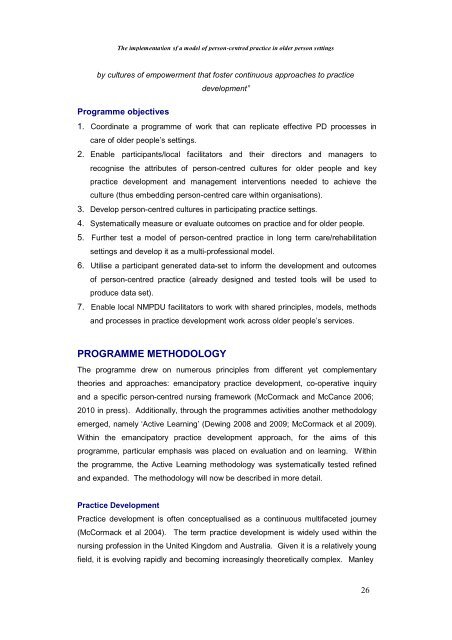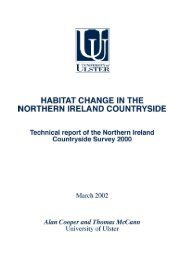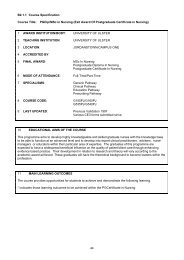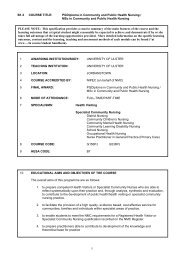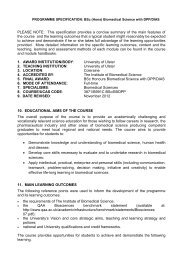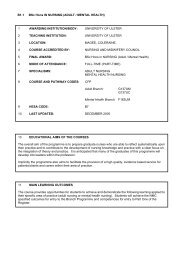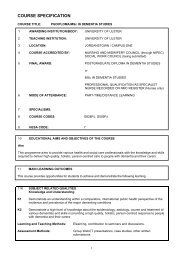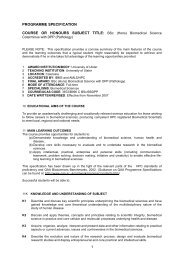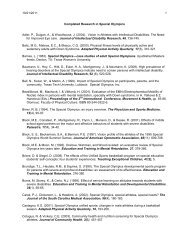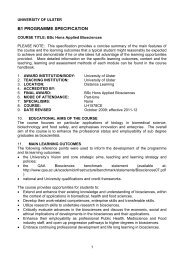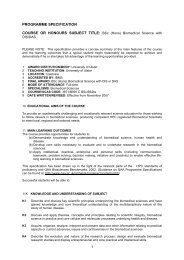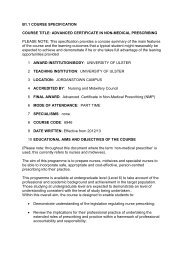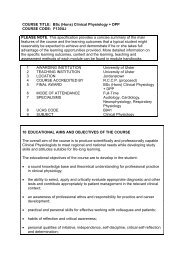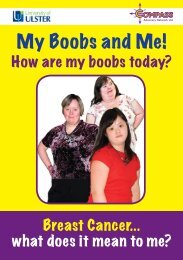The Implementation of a Model of Person-Centred Practice In Older ...
The Implementation of a Model of Person-Centred Practice In Older ...
The Implementation of a Model of Person-Centred Practice In Older ...
You also want an ePaper? Increase the reach of your titles
YUMPU automatically turns print PDFs into web optimized ePapers that Google loves.
<strong>The</strong> implementation <strong>of</strong> a model <strong>of</strong> person-centred practice in older person settings<br />
by cultures <strong>of</strong> empowerment that foster continuous approaches to practice<br />
development”<br />
Programme objectives<br />
1. Coordinate a programme <strong>of</strong> work that can replicate effective PD processes in<br />
care <strong>of</strong> older people’s settings.<br />
2. Enable participants/local facilitators and their directors and managers to<br />
recognise the attributes <strong>of</strong> person-centred cultures for older people and key<br />
practice development and management interventions needed to achieve the<br />
culture (thus embedding person-centred care within organisations).<br />
3. Develop person-centred cultures in participating practice settings.<br />
4. Systematically measure or evaluate outcomes on practice and for older people.<br />
5. Further test a model <strong>of</strong> person-centred practice in long term care/rehabilitation<br />
settings and develop it as a multi-pr<strong>of</strong>essional model.<br />
6. Utilise a participant generated data-set to inform the development and outcomes<br />
<strong>of</strong> person-centred practice (already designed and tested tools will be used to<br />
produce data set).<br />
7. Enable local NMPDU facilitators to work with shared principles, models, methods<br />
and processes in practice development work across older people’s services.<br />
PROGRAMME METHODOLOGY<br />
<strong>The</strong> programme drew on numerous principles from different yet complementary<br />
theories and approaches: emancipatory practice development, co-operative inquiry<br />
and a specific person-centred nursing framework (McCormack and McCance 2006;<br />
2010 in press). Additionally, through the programmes activities another methodology<br />
emerged, namely ‘Active Learning’ (Dewing 2008 and 2009; McCormack et al 2009).<br />
Within the emancipatory practice development approach, for the aims <strong>of</strong> this<br />
programme, particular emphasis was placed on evaluation and on learning. Within<br />
the programme, the Active Learning methodology was systematically tested refined<br />
and expanded. <strong>The</strong> methodology will now be described in more detail.<br />
<strong>Practice</strong> Development<br />
<strong>Practice</strong> development is <strong>of</strong>ten conceptualised as a continuous multifaceted journey<br />
(McCormack et al 2004). <strong>The</strong> term practice development is widely used within the<br />
nursing pr<strong>of</strong>ession in the United Kingdom and Australia. Given it is a relatively young<br />
field, it is evolving rapidly and becoming increasingly theoretically complex. Manley<br />
26


